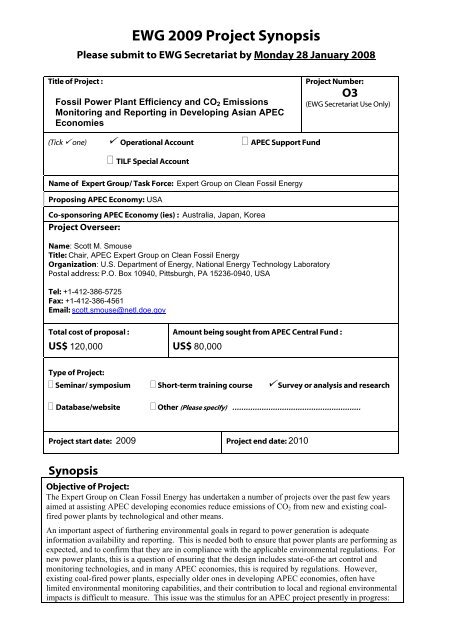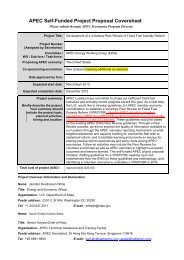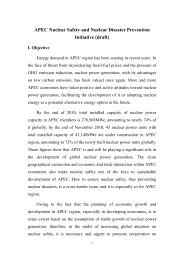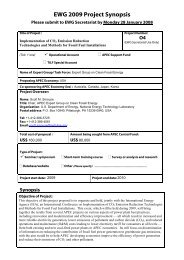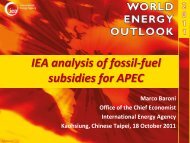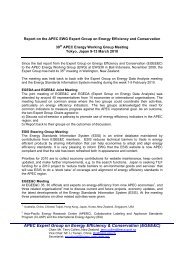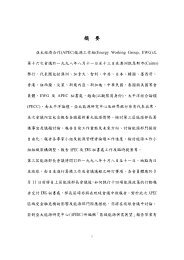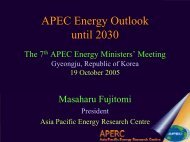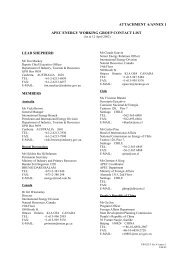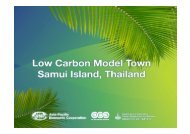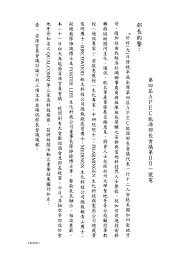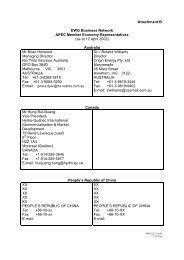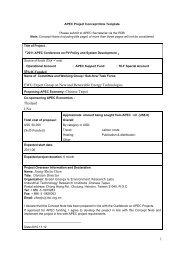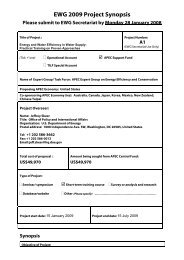EWG 2009 Project Synopsis
EWG 2009 Project Synopsis
EWG 2009 Project Synopsis
Create successful ePaper yourself
Turn your PDF publications into a flip-book with our unique Google optimized e-Paper software.
<strong>EWG</strong> <strong>2009</strong> <strong>Project</strong> <strong>Synopsis</strong><br />
Please submit to <strong>EWG</strong> Secretariat by Monday 28 January 2008<br />
Title of <strong>Project</strong> :<br />
Fossil Power Plant Efficiency and CO 2 Emissions<br />
Monitoring and Reporting in Developing Asian APEC<br />
Economies<br />
<strong>Project</strong> Number:<br />
O3<br />
(<strong>EWG</strong> Secretariat Use Only)<br />
(Tick one) Operational Account APEC Support Fund<br />
TILF Special Account<br />
Name of Expert Group/ Task Force: Expert Group on Clean Fossil Energy<br />
Proposing APEC Economy: USA<br />
Co-sponsoring APEC Economy (ies) : Australia, Japan, Korea<br />
<strong>Project</strong> Overseer:<br />
Name: Scott M. Smouse<br />
Title: Chair, APEC Expert Group on Clean Fossil Energy<br />
Organization: U.S. Department of Energy, National Energy Technology Laboratory<br />
Postal address: P.O. Box 10940, Pittsburgh, PA 15236-0940, USA<br />
Tel: +1-412-386-5725<br />
Fax: +1-412-386-4561<br />
Email: scott.smouse@netl.doe.gov<br />
Total cost of proposal :<br />
US$ 120,000<br />
Amount being sought from APEC Central Fund :<br />
US$ 80,000<br />
Type of <strong>Project</strong>:<br />
Seminar/ symposium Short-term training course Survey or analysis and research<br />
Database/website<br />
Other (Please specify) …………………………………………………<br />
<strong>Project</strong> start date: <strong>2009</strong> <strong>Project</strong> end date: 2010<br />
<strong>Synopsis</strong><br />
Objective of <strong>Project</strong>:<br />
The Expert Group on Clean Fossil Energy has undertaken a number of projects over the past few years<br />
aimed at assisting APEC developing economies reduce emissions of CO 2 from new and existing coalfired<br />
power plants by technological and other means.<br />
An important aspect of furthering environmental goals in regard to power generation is adequate<br />
information availability and reporting. This is needed both to ensure that power plants are performing as<br />
expected, and to confirm that they are in compliance with the applicable environmental regulations. For<br />
new power plants, this is a question of ensuring that the design includes state-of-the art control and<br />
monitoring technologies, and in many APEC economies, this is required by regulations. However,<br />
existing coal-fired power plants, especially older ones in developing APEC economies, often have<br />
limited environmental monitoring capabilities, and their contribution to local and regional environmental<br />
impacts is difficult to measure. This issue was the stimulus for an APEC project presently in progress:
“Environmental Monitoring for Coal-Fired Power Plants in Developing Asian APEC Economies”.<br />
As concern about greenhouse gas emissions grows, it becomes increasingly evident that more accurate<br />
information on emissions of CO 2 from fossil fuel power plants will be needed. Since the determining<br />
factors for this are coal characteristics and power plant efficiency, a good global database of actual, as<br />
distinct from theoretical, efficiencies of operating plants needs to be assembled on an international basis.<br />
The International Energy Agency (IEA) has been carrying out a number of activities related to cleaner<br />
fossil fuels, in response to a request by the G8 Gleneagles Summit in 2005, which invited the IEA to<br />
review, assess and disseminate widely information on energy efficiency of coal-fired power plants; and<br />
to recommend options to make best practice more accessible. The IEA response includes a coal-fired<br />
power database, assessment of upgrading and replacement of older coal-fired plants in major coal using<br />
economies and country-based coal-fired power sector reviews, new developments and case studies of<br />
equipment and plant upgrades in different regions aiming at efficiency improvement.<br />
Power plant efficiency data are more readily available for developed economies, but accurate information<br />
for plants in developing economies is not systematically obtained. The APEC region contains<br />
developing economies that are rapidly expanding their electricity generation sector based on fossil fuels,<br />
especially coal, so it would be appropriate for APEC to complement the IEA effort with a project to<br />
improve the availability of power plant efficiency information specifically targeted on these economies.<br />
The objectives of this project are to:<br />
• gather, synthesize, and assess experience in developing APEC economies with regard to fossil<br />
power plant efficiency monitoring and reporting by individual (both existing and new) fossil<br />
fuel-fired power generating plants;<br />
• promote regulatory requirements for information gathering on fossil power plant efficiencies in<br />
APEC economies where such requirements do not already exist; and<br />
• coordinate development of an APEC database on fossil power plant efficiencies with that of<br />
other international organizations, particularly the International Energy Agency.<br />
Methodology:<br />
The project will be initiated with a joint APEC/IEA workshop held in a developing APEC economy, and<br />
will be carried out with the assistance of a qualified consultant, who would have the task of defining the<br />
information needs in detail, assisting in organizing the workshop, analyzing the information available,<br />
and writing a final report with recommendations for action. The emphasis of the project will be on coalfired<br />
power plants, though consideration will be given to other fossil fuel plants. The consultant will<br />
work closely with a steering team of EGCFE members and IEA representatives.<br />
The workshop will bring together government and power industry representatives from APEC<br />
economies, to define, identify, and exchange information relevant to the objectives of the project.<br />
Among topics that the workshop will cover are:<br />
• Availability of statistical information about coal quality on an individual plant basis.<br />
• Availability of information on actual generating efficiencies of individual plants on an annual<br />
basis.<br />
• Factors affecting calculation of annual CO emissions from individual plants.<br />
2<br />
• Current relevant reporting requirements in force in individual APEC economies, for new and<br />
existing fossil power plants<br />
• Recommendations for improving the availability of information on individual fossil power plant<br />
generating efficiency and CO emissions in APEC economies.<br />
2<br />
• Integration of an APEC database on fossil power plant efficiencies with that of other<br />
international organizations.<br />
How does the project proposal align with <strong>EWG</strong> and APEC-wide priorities:<br />
This project will strengthen regional energy security by preserving the coal option while creating<br />
essential conditions for improving environmental protection in the power generation sector.<br />
The Declaration by APEC Energy Ministers meeting in Darwin in 2007 stated that improving energy<br />
efficiency is a cost-effective way to enhance energy security and mitigate greenhouse gas emissions.<br />
Ministers encouraged the development of cleaner and more efficient power generation technologies.<br />
APEC Economic Leaders, meeting in Sydney in September 2007, addressed the challenges of climate
change, energy security and clean development, outlining their resolve on this issue in their Declaration<br />
on Climate Change, Energy Security and Clean Development, which included the following statements:<br />
• We, the APEC Economic Leaders, agree that economic growth, energy security and climate<br />
change are fundamental and interlinked challenges for the APEC region.<br />
• Our success has relied in part on secure supplies of energy, the use of which has also contributed<br />
to air quality problems and greenhouse gas emissions.<br />
• We are committed, through wide-ranging and ambitious actions, to ensuring the energy needs of<br />
the economies of the region while addressing the issue of environmental quality and contributing<br />
to the reduction of greenhouse gas emissions.<br />
• Fossil fuels will continue to play a major role in our regional and global energy needs, Cooperation,<br />
including joint research, development, deployment and transfer of low and zero<br />
emission technologies for their cleaner use, particularly coal, will be essential.<br />
• Improving energy efficiency is a cost-effective way to enhance energy security and address<br />
greenhouse gas emissions while promoting economic growth and development.<br />
This project responds to the energy efficiency goals of APEC Energy Ministers, in that its overall<br />
objective is to contribute to mitigation of greenhouse gas emissions by improving the availability of<br />
information on the actual generating efficiencies and amounts of CO 2 emitted annually by existing fossil<br />
fuel power plants in APEC economies.<br />
The primary objective of the project is to contribute to mitigation of global climate change due to CO 2<br />
emissions by means of improving the information available on emissions from fossil power plants in the<br />
APEC region. Global climate change is expected to impact agricultural production and the availability of<br />
water, and to cause sea levels to rise. These and other negative impacts of climate change more<br />
significantly impact the poor and disadvantaged, including often women. These sectors of human society<br />
are less able to afford to adapt to their changing surroundings.<br />
To ensure that the women’s perspectives are adequately represented, active participation of and input by<br />
women into the project will be sought through the members of the EGCFE steering committee.<br />
Cooperation in this endeavour by representatives of the IEA will also be sought. The project itself will be<br />
carried out by a consultant in response to a tender. In its evaluation of submitted bids, specific attention<br />
will be given to qualified women proposed by the bidder to work on the project. The EGCFE members<br />
involved will ensure that the winning submission adheres to the priorities of the Framework for the<br />
Integration of Women in APEC (“Accelerate the progress of integrating women in the mainstream of<br />
APEC processes and activities” and “Promote and encourage the involvement of women in all APEC<br />
fora”). The APEC Framework, as well as the Gender Analysis Guide and other relevant documents, will<br />
be made available to those involved in the project; their application will be monitored throughout the<br />
project.
INCORPORATING SUSTAINABLE DEVELOPMENT PRINCIPLES<br />
INTO <strong>EWG</strong> PROJECTS<br />
Process for incorporating sustainable development principles:<br />
1. <strong>Project</strong> Overseer complete self-assessment rating for each project proposal<br />
2. For APEC-funded projects, <strong>Project</strong> Overseer incorporates the principles into the project tender, tender<br />
assessment, and project implementation phases<br />
3. On completion of a project, the <strong>Project</strong> Overseer describes how the principles were addressed and<br />
their impact at the project evaluation phase (through a separate report).<br />
Sustainable Development<br />
Principle<br />
Strengthening regional energy<br />
security<br />
Supporting energy market<br />
reform and energy<br />
infrastructure development<br />
Promoting uptake of clean and<br />
efficient energy and efficient<br />
use of energy<br />
Building capacity and technical<br />
cooperation within APEC<br />
economies<br />
Building public-private<br />
partnerships and strengthening<br />
stakeholder engagement,<br />
1<br />
including with the APEC<br />
business community<br />
TOTAL SCORE 5<br />
SELF-ASSESSMENT RATING<br />
<strong>Project</strong><br />
Supporting Information<br />
Link (1<br />
point for<br />
each)<br />
1<br />
1<br />
1<br />
1<br />
By helping to improve the availability of information<br />
on generating efficiencies of individual coal-fired<br />
power plants, and promoting effective reporting<br />
requirements for generating efficiencies of new and<br />
existing plants, this project will strengthen regional<br />
energy security by preserving the coal option while<br />
addressing the climate change issue.<br />
The project will develop information that provides<br />
incentives for improving the efficiency of new and<br />
existing power generation infrastructure.<br />
This project will promote the uptake of cleaner and<br />
more efficient coal power generation technologies, as<br />
well as improvement of the efficient use of energy in<br />
existing power plants.<br />
This project will help member economies build<br />
capacity in power plant operational performance, and<br />
provide opportunities for technical cooperation on<br />
best practices in this area.<br />
The project will strengthen public-private sector<br />
dialog and encourage technologies and methods for<br />
more efficient power generation, with private sector<br />
involvement in APEC economies.


